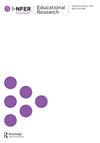包容性、友谊和语言学习:促进互动小组的合作
IF 2.6
3区 教育学
Q1 EDUCATION & EDUCATIONAL RESEARCH
引用次数: 1
摘要
摘要背景在语言多样的背景下,语言学习和建立优质关系是关键的、相互交织的教育目标。这些方面在学习社区中尤为重要,在学习社区,教学语言可能代表大多数学生的额外语言。因此,确定能够促进所学语言高质量互动的活动是至关重要的。互动小组(IGs)是一项教育行动,旨在为促进所有学习者的团结、协作互动和有效参与关系创造有利条件。有必要研究如何在特定社会语言学背景下,将IGs与代表少数民族语言的教学语言一起最有益地使用,并将其作为大多数学生的第二语言,就像巴斯克国家的巴斯克语一样。目的本探索性案例研究旨在(1)探讨政府间组织对大多数学生学习巴斯克语(一种少数民族语言和学校教学语言)作为第二语言的影响,以及(2)调查政府间组织与学生的大学关系。方法通过对学生、教师、学校工作人员和志愿者的14次访谈收集数据,并考虑来自28个政府间组织的材料。进行了深入的定性分析。研究结果分析表明,IGs期间课堂交流机会的增加提高了合作语言学习互动的水平。此外,学生之间的脚手架和支持性交流有助于大学友谊的发展。结论在我们的小规模研究中,巴斯克地区的互动和学生之间的友好合作在IGs内部得到了发展和实现。这突出了政府间组织在促进额外语言和少数民族语言学习以及促进参与活动的学生之间积极关系的发展方面的潜力。本文章由计算机程序翻译,如有差异,请以英文原文为准。
Inclusivity, friendship and language learning: boosting collaboration in interactive groups
ABSTRACT Background In linguistically diverse contexts, language learning and the building of quality relationships are key – and intertwined – educational goals. These aspects are particularly important in learning communities where the language of instruction may represent an additional language for most students. It is, therefore, essential to identify activities that promote quality interactions in the language to be learnt. Interactive Groups (IGs) is an educational action that aims to create conditions conducive to promoting relationships of solidarity, collaborative interaction, and effective participation for all learners. There is a need to investigate how IGs may be most beneficially used with languages of instruction that represent minority languages within the given sociolinguistic context and are a second language for most students, as is the case with the Basque language in the Basque Country. Purpose This exploratory case study sought (1) to explore the influence of IGs on the learning of Basque (a minority language and the language of instruction at school) as a second language for most students, and (2) to investigate the IGs in relation to students’ collegial relationships. Methods Data were collected via a total of 14 interviews with students, teachers, school staff and volunteers, along with the consideration of material from 28 IGs. In-depth qualitative analyses were conducted. Findings Analysis suggested that the increased opportunities to communicate in the classroom during IGs bolstered the levels of collaborative language learning interactions. In addition, the scaffolding and supportive exchanges between students contributed to the development of collegial friendships. Conclusion In our small-scale study, interaction in Basque and friendly collaboration between students developed and was enabled within the IGs. This highlights the potential of IGs to foster the learning of additional and minority languages, as well as to promote the growth and flourishing of positive relationships between students involved in the activities.
求助全文
通过发布文献求助,成功后即可免费获取论文全文。
去求助
来源期刊

Educational Research
EDUCATION & EDUCATIONAL RESEARCH-
CiteScore
4.00
自引率
2.90%
发文量
0
期刊介绍:
Educational Research, the journal of the National Foundation for Educational Research (NFER), was established in 1958. Drawing upon research projects in universities and research centres worldwide, it is the leading international forum for informed thinking on issues of contemporary concern in education. The journal is of interest to academics, researchers and those people concerned with mediating research findings to policy makers and practitioners. Educational Research has a broad scope and contains research studies, reviews of research, discussion pieces, short reports and book reviews in all areas of the education field.
 求助内容:
求助内容: 应助结果提醒方式:
应助结果提醒方式:


